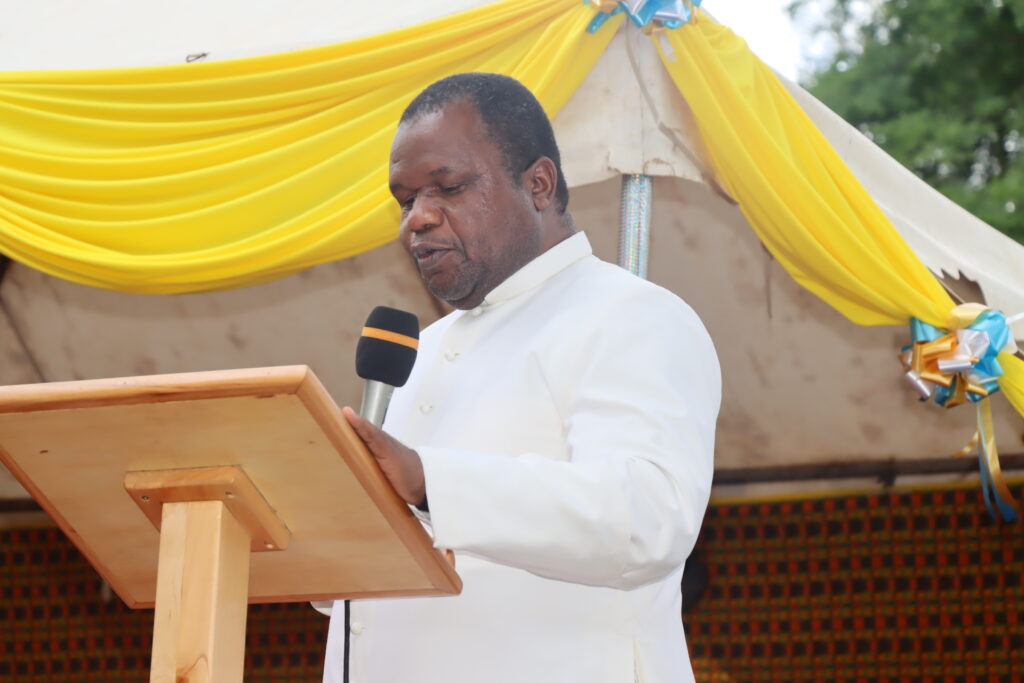AMECEA: At 25 Years, Regional Seminary of Bakanja Recalls the Intention of Founding Fathers

the rector of BBAC Very Rev. Peter Moudie Zingari
Sr. Jecinter Antoinette Okoth, FSSA
By the time Blessed Bakanja AMECEA College (BBAC) was established 25 years ago, the leadership of the seminary recounts that the founding fathers who were the bishops from the Association of Member Episcopal Conferences in Eastern Africa (AMECEA) region had a purpose of coming up with such a formation house.
“It is the time we remember the idea of our fathers in faith for the 25 years of pastoral work in the Church. They needed those who were full of missionary spirit to support the Local church in need,” the rector of BBAC Very Rev. Peter Moudie Zingari said during the celebration on Saturday, October 21.
According to Fr. Moudie who has been at the helm of the seminary since August 2018, underscored that the objectives of the forefathers to establish the seminary was for the “Formation of seminarians from AMECEA countries who are to become ministers of Christ sharing in the unique office of mediation, form the four-cycle for the college of theology of CUEA (The Catholic University of Eastern Africa) and to create unity and missionary spirit among the pastoral agents of the first backgrounds, cultures, and countries in the region while training diocesan priests together in one formation house.”
Celebrating the Silver Jubilee under the theme, ‘looking at the past 25 years with gratitude, living the present with passion, and moving towards the future with hope,’ the South Sudanese cleric from the Catholic Diocese of Tombura-Yambia affirmed that the seminary has faithfully respected the objectives of the founding fathers, as they ensure “Seminary formation covers all the four pillars of formation that is human, Spiritual, intellectual, and pastoral with an open and free approach.”
Additionally, Fr. Moudie said, “Blessed Bakanja has formed and produced many priests in the region who are doing commendable pastoral work and seminarians are able to develop their talents as they continue to discover and discern their vocation to the priesthood in a mature and transparent way.”
As formators of the young men, the cleric referenced the message from prophet Isaiah that their role is to “help young men mark out the Spirit of the Lord in them, take council for enlightenment, and teach them the right way of judgment and knowledge so that they know the way of discerning their own vocation.”
So far, the seminary has admitted not only young men from the nine AMECEA countries of Kenya, Uganda, Tanzania, Zambia, Malawi, Sudan, South Sudan, Ethiopia, and Eritrea but also from other regions including Djibouti, the Democratic Republic of Congo, and Rwanda.
On his part, the Vice Chancellor and rector of CUEA Fr. Stephen Mbugua Ngari acknowledged the collaboration between the university and the seminary which helps in promoting unity not only within the AMECEA region but also the entire Church.
“We work on many issues together so as to support one another to achieve our mission and vision. We are grateful for the cordial relationship with the seminarians in the university they are the best models for our students and staff,” Fr. Mbugua narrated in his speech and acknowledged that mentoring is much better than any other form of character formation”
“I know that this partnership will be of equal opportunity and benefit to us as we grow our Church and our AMECEAness as CUEA and Bakanja Seminary,” he added.
Also speaking during the event was the Vice Rector of the seminary Fr. John Njue who stressed that seminarians gave due prominence to prayer in preparations for the jubilee saying “Unless the Lord builds the house, in vain do the builders labor.”
The Kenyan cleric who was the chairman of the organizing committee for the jubilee which comprised members from various institutions highlighted that the leadership of the seminary intends to renovate the building structures which are already worn out with the passing of years to a cost of approximately 13M Kshs. (88,000$).
With this amount, Fr. Njue said, “It will make Bakanja a suitable home for the training of our future priests.”


